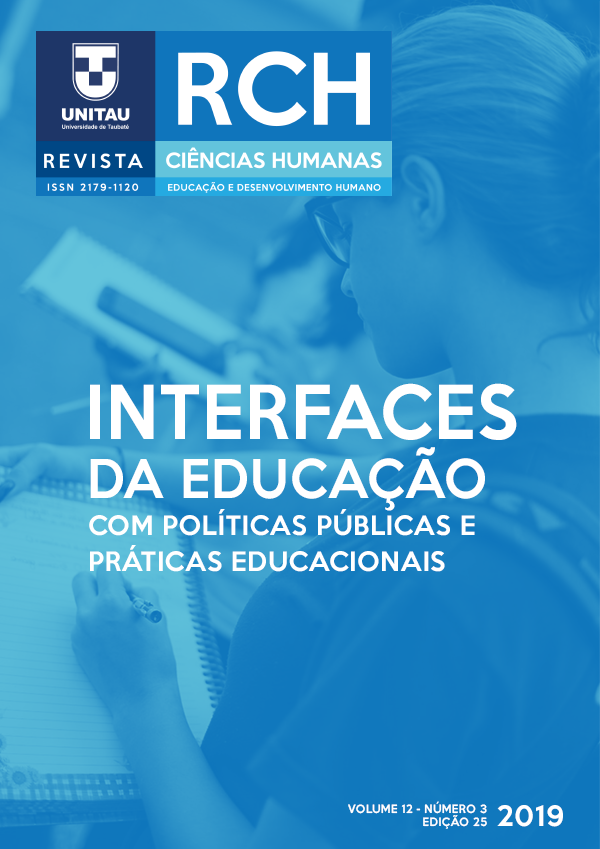EDUCAÇÃO TRANSFORMADORA: DESENVOLVENDO A CONSCIÊNCIA AMBIENTAL EM ALUNOS DO ENSINO FUNDAMENTAL
DOI:
https://doi.org/10.32813/2179-1120.2019.v12.n3.a553Palavras-chave:
Meio Ambiente. Consciência ambiental. Educação ambiental. Cartilha.Resumo
Muitos são os problemas ambientais decorrentes da falta de conscientização da sociedade acerca do desenvolvimento sustentável. Esse trabalho tem o objetivo de aprimorar a consciência ambiental de alunos do sexto ano do ensino fundamental de uma escola rural do munícipio de Paraibuna, por meio da autoanálise dos estudantes e da produção, em grupo, de uma cartilha de conscientização ambiental, buscando desenvolver a autonomia e as habilidades de comunicação, de socialização dos estudantes e da abordagem de temas transversais ligados ao meio ambiente e de educação ambiental dos alunos e da comunidade. Os resultados apresentados ilustram a importância do desenvolvimento de projetos de conscientização ambiental, desde sua idealização em sala de aula até a confecção do material final, pois permitiu o envolvimento dos estudantes com a temática, além colocar o aluno como centro do processo de ensino e aprendizagem.
Métricas
Referências
ABÍLIO, F.J. P. Ética, Cidadania e Educação Ambiental. In: Andrade, M.O. (org.). Meio Ambiente e Desenvolvimento: bases para uma formação interdisciplinar. João Pessoa, PB: Editora Universitária da UFPB, 2008.
BRASIL. Parâmetros Curriculares Nacionais: ciências naturais. Secretaria de Educação Fundamental. – Brasília: MEC/SEF, 1997. 136p.
_______. Parâmetros Curriculares Nacionais: meio ambiente. Secretaria de Educação Fundamental. – Brasília: MEC/SEF, 1997. 128p.
COCCO, S. Student leadership development: The contribution of project-based learning (Unpublished Master’s thesis). Royal Roads University, Victoria, BC, Canada. 2006
DIAS, G. F. Educação ambiental, princípios e práticas. São Paulo: Gaia, 2004.
FERNANDES, S., MESQUITA, D., FLORES, M. A.; LIMA, R. M. Engaging students in learning: findings from a study of project-led education. European Journal of Engineering Education, Vol 39, No. 1, pp.55-67. 2014.
GRAFF, E.; KOLMOS, A. (2003). Characteristics of Problem-Based Learning. International Journal of Engineering Education, Vol 19, No. 5, pp. 657-662. 2003
JACOBI, Pedro. Educação ambiental, cidadania e sustentabilidade. Cad. Pesquisa. São Paulo, n. 118 p. 189-206, Mar 2003.
JACOBI, Pedro Roberto. Educação ambiental: o desafio da construção de um pensamento crítico, complexo e reflexivo. Educ. Pesquisa, São Paulo, v. 31, n. 2, p. 233-250, ago. 2005
LIMA, R. M.; SILVA, J. M.; JANSSEN, N.; MONTEIRO, S. B. S.; SOUZA, J. C. F. Project-based learning course design: a service design approach. International Journal. Services and Operations Management, 11(3), 2002
MASSON, T. J.; MIRANDA, L. F.; MUNHOZ, A. H.; CASTANHEIRA, A. M. P. Metodologia de ensino: aprendizagem baseada em projetos (PBL). In: Anais do XL Congresso Brasileiro de Educação em Engenharia (COBENGE), Belém, PA, Brasil. 2012
MILLS, J. E., & TREAGUST, D. F. Engineering Education - Is Problem-Based or Project-Based Learning the Answer? Australasian Journal of Engineering Education, (February). 2003. Disponivel em: http://www.engineersmedia.com.au/journals/aaee/a2index.html. Acesso em 13 maio 2018
PIN, Adriana. et al. Educação ambiental na perspectiva transdiciplinar: uma prática pedagógica direcionada aos alunos da turma do segundo ano técnico em mecânica integrado ao ensino médio do IFES campus São Mateus (ES). Acta Semiótica Linguística. Paraíva, v. 21, n. 2, p. 76-85, 2016.
POWELL, P. C.; WEENK, W. Project-led engineering education. Utrecht: Lemma Publishers. 2003
SILVA, Katia Araújo et al. Elaboração de uma cartilha como material educativo para preservação da tartaruga verde (chelonia mydas) em Itaipú, Niterói, Rio de Janeiro. Revista presença, [s.l.], v. 2, p. 35-58, aug. 2017. Issn 2447-1534.
SORRENTINO, M. et al. Educação ambiental como política pública. Educação e Pesquisa, São Paulo, v. 31, n. 2, p. 285-299, 2005.
SCHULTZ, P. W. Environmental attitudes and behaviors across cultures. In W. J. Lonner, D. L. Dinnel, S. A. Hayes, and D. N. Sattler. Online readings in psychology and culture (unit 8, chapter 4), Center for Cross Cultural Research, Western Washington University, Bellingham, Washington USA (2002).
THOMAS, J. W. A review of research on Project-Based Learning”. San Rafael. CA. 2000 Disponivel em: http://www.bie.org/images/uploads/general/9d06758fd346969cb63653d00dca55c0.pdf Acessado em: 15 Abr 2019
TRISTÃO, M. Saberes e fazeres da Educação Ambiental no cotidiano escolar. Revista brasileira de educação ambiental, Brasília: Rede Brasileira de Educação Ambiental, n.0, p. 47-55, 2007.
Downloads
Publicado
Como Citar
Edição
Seção
Licença
As publicações da Revista Ciências Humanas estão registradas sob a licença Creative Commons Attribution CC-BY.
1. Os conteúdos dos trabalhos são de exclusiva responsabilidade de seu autor.
2. É permitida a reprodução total ou parcial dos trabalhos publicados na Revista, desde que citada a fonte.
3. Ao submeterem seus trabalhos à Revista os autores certificam que os mesmos são de autoria própria e inéditos (não publicados em qualquer meio digital ou impresso).
4. Os direitos autorais dos artigos publicados na Revista são do autor, com direitos de primeira publicação reservados para este periódico.
5. Para fins de divulgação, a Revista poderá replicar os trabalhos publicados nesta revista em outros meios de comunicação como, por exemplo, redes sociais (Facebook, Academia.Edu, etc).
6. A Revista é de acesso público, portanto, os autores que submetem trabalhos concordam que os mesmos são de uso gratuito.
7. Constatando qualquer ilegalidade, fraude, ou outra atitude que coloque em dúvida a lisura da publicação, em especial a prática de plágio, o trabalho estará automaticamente rejeitado.
8. Caso o trabalho já tenha sido publicado, será imediatamente retirado da base da revista, sendo proibida sua posterior citação vinculada a ela e, no número seguinte em que ocorreu a publicação, será comunicado o cancelamento da referida publicação. Em caso de deflagração do procedimento para a retratação do trabalho, os autores serão previamente informados, sendo-lhe garantido o direito à ampla defesa.
9. Os dados pessoais fornecidos pelos autores serão utilizados exclusivamente para os serviços prestados por essa publicação, não sendo disponibilizados para outras finalidades ou a terceiros.





